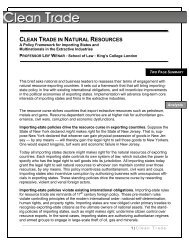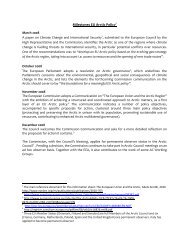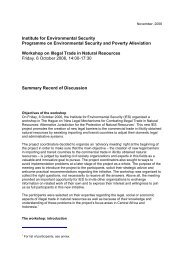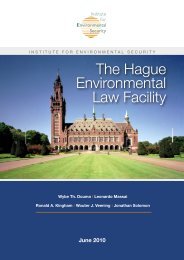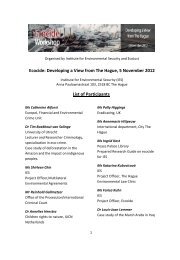III-B. Profile of the European Union - Institute for Environmental ...
III-B. Profile of the European Union - Institute for Environmental ...
III-B. Profile of the European Union - Institute for Environmental ...
Create successful ePaper yourself
Turn your PDF publications into a flip-book with our unique Google optimized e-Paper software.
Inventory <strong>of</strong> Environment and Security Policies and Practicesstability on <strong>the</strong> ground. For example, in <strong>the</strong> occupied territories, where <strong>the</strong> environmentalsecurity issue is very much related to scarce water resources, <strong>the</strong> EU has been workingtowards <strong>the</strong> creation <strong>of</strong> a two-state solution. In Aceh, where EU <strong>of</strong>ficials are monitoring<strong>the</strong> implementation <strong>of</strong> <strong>the</strong> peace agreement that was negotiated by <strong>for</strong>mer FinnishPresident Martti Ahtisaari, <strong>the</strong> environmental issue has <strong>of</strong> course been <strong>the</strong> continuingillegal logging that has provided <strong>the</strong> revenue engine to finance ongoing conflict in <strong>the</strong>region.By contrast, in <strong>the</strong> Congo, where <strong>the</strong> illegal trade in gold and diamonds has paid <strong>for</strong> andhas indeed ensured <strong>the</strong> pr<strong>of</strong>itability <strong>of</strong> <strong>the</strong> conflict, <strong>the</strong> EU has addressed its ef<strong>for</strong>ts toimprove <strong>the</strong> functioning <strong>of</strong> <strong>the</strong> Defence Ministry apparatus, especially to ensure that <strong>the</strong>army is properly remunerated. This is an important priority since experience has revealed<strong>the</strong> destabilising role played by an unpaid army or indeed an army paid <strong>for</strong> by localcommanders, a scenario, Dr. Cooper emphasised, facilitates “power grabs” by war-lords.Thus, <strong>the</strong> EU will continue to assist <strong>the</strong> UN in establishing multi-party elections as part <strong>of</strong>a long-term political process <strong>of</strong> building democratic institutions. Darfur on <strong>the</strong> o<strong>the</strong>r hand,was referred to ra<strong>the</strong>r starkly as <strong>the</strong> “first war <strong>of</strong> climate change”.2.5. Country and Regional Strategy PapersThe EU has now developed instruments such as <strong>the</strong> Country and Regional StrategyPapers 15 , which outline policy priorities, <strong>the</strong> Check-List <strong>for</strong> Root Causes <strong>of</strong> Conflict 16and <strong>the</strong> continually revised Watch List <strong>of</strong> Priority Countries (countries where <strong>the</strong>re is aserious risk <strong>of</strong> conflict).The CSPs and RSPs are or can be particularly important with regard to <strong>the</strong> linkagesbetween development and security concerns. Be<strong>for</strong>e <strong>the</strong> end <strong>of</strong> <strong>the</strong> preparation <strong>of</strong> a CSP,<strong>the</strong> EC staff in each beneficiary country is required to undertake - or contract consultantsto undertake - a Country <strong>Environmental</strong> <strong>Pr<strong>of</strong>ile</strong> (CEP) which brings in <strong>the</strong> environmentaldimensions. (See 3.6 below under <strong>Environmental</strong> Mainstreaming in EC DevelopmentCooperation.)2.6. EU policies with Neighbouring StatesA comprehensive approach to security is particularly characteristic <strong>of</strong> EU policy withrespect to neighbouring States, which it attempts to integrate in an encompassingnetwork <strong>of</strong> relations, <strong>for</strong> example, <strong>the</strong> Stability Pact <strong>for</strong> <strong>the</strong> Balkans 17 , <strong>the</strong> Euro-Mediterranean Partnership (EMP) 18 , and <strong>the</strong> successful transition <strong>of</strong> Central andEastern Europe. More specifically, <strong>the</strong> EU Neighbourhood Policy (ENP) 19 provides <strong>for</strong>an enhanced framework <strong>for</strong> relations between <strong>the</strong> EU and its neighbours. Theoverarching objective <strong>of</strong> <strong>the</strong> ENP is to achieve an ‘area <strong>of</strong> shared prosperity and values’by creating close partnerships with <strong>the</strong> EU’s neighbouring States. The comprehensiveconcept <strong>of</strong> security is reflected in this track, in light <strong>of</strong> <strong>the</strong> ENP’s emphasis on linking indep<strong>the</strong>conomic integration, close political and cultural relations toge<strong>the</strong>r with a jointresponsibility <strong>for</strong> conflict prevention.15 The Country and Regional Strategy Papers are available at:http://ec.europa.eu/comm/external_relations/sp/index.htm16 See: Conflict Indicators/ <strong>European</strong> Commission Check-list <strong>for</strong> Root Causes <strong>of</strong> Conflict:http://europa.eu.int/comm/external_relations/cfsp/cpcm/cp/list.htm17 See: http://www.stabilitypact.org/18 See: http://ec.europa.eu/comm/external_relations/euromed/index.htm19 See: http://ec.europa.eu/world/enp/index_en.htm<strong>III</strong>-B / 5



